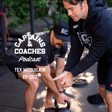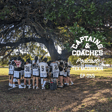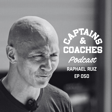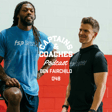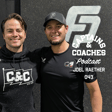Introduction to Leadership in Athletics
00:00:00
Speaker
We as coaches work for our players. they're not They're not our players who are going to go execute what we want at a moment's notice. We are the ones who are empowering them to find their gifts and their understanding in order to allow them to be fluidly capable of attaining whatever else they want to learn or do or or like b Welcome to the Captains and Coaches podcast. We explore the art and science of leadership through the lens of athletics and beyond.
00:00:30
Speaker
I'm your host, Tex McQuilkin, and I am stoked for
Revolutionizing Lacrosse Education
00:00:33
Speaker
today's episode. Passion is the name of the game as we're joined by Patrick Chapla, the founder of Powlax, who's revolutionizing lacrosse education and skill development through gamification.
00:00:45
Speaker
Whether you're a lax person or not, Patrick has a great story and a mission as he's transformed his D3 All-Star playing career into a mission to make lacrosse accessible and enjoyable for players, parents, and coaches at all levels. From his early coaching experiences with at-risk youth to developing a comprehensive training framework that is now used worldwide, Patrick brings unmatched passion and expertise to growing the game.
00:01:10
Speaker
With that, let's pass it off to Patrick to help us raise the game. Ready, ready, game. And we quickly discovered that we were both Division III All-Stars and played against each other way back when in in college, man. So you did get the best of me and my team back in the late 2000s.
00:01:31
Speaker
So i won't hold that against you. I might have been on the bench at that point. I think I think i was a sophomore or freshman that year. But yeah, that was good. but One of the best mascots in sports, the Goucher Gophers. so Absolutely.
00:01:45
Speaker
d i i do love me some D3 or just off-the-cuff Division one mascots. Something to be celebrated. Definitely. Cool, man. Well, like lacrosse is a big part of your life, and that...
00:02:00
Speaker
Myself included, man, but you've been able to turn it into a a wrecking ball force of education for the sport and truly taking young athletes, coaches and parents where they can't take themselves.
00:02:13
Speaker
The sport continues to to gain momentum across the country. You're located in in Denver, Colorado here. So that pushed the wave and then the use of the internet. Now, what I would say, the only thing holding the sport back is coaches.
00:02:29
Speaker
Now you are tapping into that and providing a solution for everyone.
Global Lacrosse Training Framework
00:02:33
Speaker
ah Get us started in your coaching journey that led even up to your position with your family in Colorado and now Palax.
00:02:42
Speaker
Cool. um So in terms of the coaching, i when I graduated from CU, so I was two years at Goucher, then played at CU for a fall.
00:02:53
Speaker
And I missed my GPA requirement for CU by 0.02 of a cumulative. so I started coaching while I was in college.
00:03:04
Speaker
um I did psych and neuroscience in college at CU. And then when I left, my brother and dad had worked at a youth corrections facility called Ridgeview Academy. And a few years previous to this, the director, Bill Wood, asked my brother what he would do with like five grand for their community because he was doing really good stuff there.
00:03:24
Speaker
And he said, I'd start a lacrosse program. And the lady looks across the table at him and he's like, you want to give these kids sticks to hit each other with? And he's like, yup, totally. It'll help build the community. And so these are all troubled youth, a lot of gang members. And so when I got there, I took over the program and um one of the that the unit manager that I had, he actually it was the story of a new movie called Hard Miles.
00:03:56
Speaker
And we were sitting in a group discussion at one point and he recommended to read Feel the Fear and Do It Anyway. And I read the book and two weeks later, I quit working at Ridgeview to pursue lacrosse full time.
00:04:09
Speaker
And then few months later, i um got Twitter and saw that 3D Lacrosse was doing a um ah clinic at their Denver shootout. And so I went there to see what they were doing and was taking notes and Jamie Monroe pulls up on a cart.
00:04:26
Speaker
And he's like, what are you doing? I'm like, I'm just seeing what you guys are doing. And he's like, I want you to come coach with me. So I got two years coaching with one of the most amazing coaches ever, Jamie Monroe, who one who runs Jam 3 Sports.
00:04:38
Speaker
And he gave me my master's in lacrosse. Mm-hmm. Two years working with him, I started coaching Grandview and kind of decided I didn't want to help 3D build 3D. I wanted to help build my own thing.
00:04:52
Speaker
And so then I started creating videos, content, and I put it behind a paywall. It did nothing for two years. Gary Vee said, put all your best stuff out for free. So I put all of it out for free and people started to flock to it.
00:05:07
Speaker
They loved how it was explained, how it was simple and Eventually, I learned how to create packages to monetize through printable playbooks, through ah digital playbook, and these other options where it gives coaches the ability to go make an impact in a way where the kids respond.
00:05:29
Speaker
Because the verbiage you use, how you approach each situation, not getting dialed into menial details for younger ages because you're just you know you just got to let them play at that point. And As it's grown, i was lucky enough when I was five to my older brothers were invited to play lacrosse. So I always had a stick in my house and it became our family sport. And so my objective is to make lacrosse as simple as possible to create confident coaches, supportive parents and motivated players where they, all the little, um,
00:06:07
Speaker
roadblocks like this stick, how it performs, all the little things where parents don't know about the game. So they've got to learn enough where they feel like they could help their kid coaches. Many of them are dads and giving them a structure and a foundation that allows them to go learn and put things into that structure is kind of the mission. And it's been, I think it's It's 2025 now, so it's been like 12 years and just, you know, stacking each brick, right? i'm Trying to build a wall.
00:06:37
Speaker
Each brick I try and stack as perfectly as possible. Make it evergreen content where people can go back to it years down the road and still reference it and think it's good. And yeah.
Coaching Strategies and Global Reach
00:06:49
Speaker
That's awesome, man. And which which age groups did you start targeting? Was it with the high school? Was it with the middle school levels? so it was when i began it was I wanted to get all of what I knew out.
00:07:04
Speaker
And so I had a big list of 50 videos and then a date and it was just check them off, right? Three hours this night, six hours this night.
00:07:15
Speaker
And as I went through them, the weird thing about lacrosse is that the same strategies and techniques in teaching work for about fourth grade through high school.
00:07:26
Speaker
It's all about the expectations you set for the players and how you can frame it in a way that allows the kid to grasp it. But so right now we're working on very detailed, like K through two, two hour bootcamp for coaches, three, four, two hour bootcamp, where as the coaches progress through it, each year they have a actionable resource they can go automatically that allows them to hit all the pieces and so one of the things about lacrosse that i find to be just incredible is all the phases of the game like you have a face-off and there's a strategy there you've got offensive and defensive transition there are strategies there settled offense settle defense man up man down rides clears
00:08:17
Speaker
And the ability for a fifth to sixth grade coach to run practice plans that not only hit all those pieces, but keep the kids interested and involved and active from not coming from the sport is a very challenging task that I've been lucky enough to be in today.
00:08:38
Speaker
from the player level through watching coaches coach and then seeing how at each stage there are specific things they can do that activate all those principles of having fun, um creating great cultures, ensuring that the parents feel like their kid is not on an island.
00:08:59
Speaker
because they don't know, they can't help them, but they can if they reference these videos. And it's it's been an incredible journey. One quick story, I was in... um California at an adrenaline tournament.
00:09:14
Speaker
And I'm hanging out with this guy, Isaac, who runs Phantom Lacrosse. He makes these um wooden sticks and engraves them personally. And I like kind of look over and there's this Japanese kid over there. And he's like looking at the stuff and he like looks up at me and he's like, Baulax?
00:09:31
Speaker
Baulax? And I'm like, yeah, what's up, man? And he's like, oh, and he runs off. And about two minutes later, there's 40 Japanese players and two coaches who are watching me do tricks and like, we love your stuff. So to connect that story, I had a guy reach out and say, hey, can I take your video and transcribe Japanese on it?
00:09:54
Speaker
I was like, of course, dude. And so then they had used these to coach their teams. And it was just the most incredible experience thing of just the mechanics of the internet.
00:10:10
Speaker
And now Palax is being used all over the world. And it's, it's, it's been incredible. Yeah, man, that, that is awesome. And I know the, the PLL l is making a big push towards that market.
00:10:22
Speaker
Yeah. Become friends with Jack Posey. He's based in Dallas coaching out of the lacrosse barn. And he was one of the dudes selected to to go over and just the enthusiasm that he brings to life, I'm sure is even though there's of course a a language barrier, just his energy and smile I imagine was creating that spark necessary.
00:10:45
Speaker
Have you happened to ever read the book by Malcolm glad Gladwell, Outliers? Of course. Yeah. Oh, yeah. So it just speaks on that spark that just creates these pockets of of power for sport in ah you know and the Dominican for baseball and tennis in Russia. So it is exciting.
00:11:05
Speaker
Totally. And so when I think of that spark, that spark for me was... my father and my brothers. They were older than me by a good amount. And so, and I was an only child where i had my mom's side where I was mostly than my dad's side where I'd go every other weekend. And because I was, i was the only one from my mom, my dad, then I've got older brothers. And then, but so as I went each place, I would have to kind of figure out my way by myself.
00:11:35
Speaker
lot of one-way drives with my dad and my mom, which were awesome. But that spark was created in always being able to walk by the stick, being able to look over and pick it up once every two weeks.
00:11:50
Speaker
And then whenever I'd pick it up and my brother be there, he'd teach me something. And it like hooked me in. And then throwing in the front yard with my dad where he was 44 when he found the sport.
00:12:02
Speaker
And so he um picked it up. He coached at Ridgeview with us and he really dove into it. But so his story kind of, I think lacrosse is something where a lot of people get caught up in the ages or where I'm going to go here and there, but lacrosse can definitely transcend the age barrier. Like we have a team in Colorado of all dads who never played as kids and they play men's league so that they can get experience playing in order to teach their players.
00:12:35
Speaker
But so for that spark, when when I watched my brothers and, you know, we would, my brother and I would shoot at this wooden dog house and like when he'd be just cranking on it and he'd hit it and I'd like, you know, do it all weird. but when I hit it, it it felt so good.
00:12:50
Speaker
And then I went into doing tricks and that's where I learned how to fail. Like that was the that was foundational for me because I would try these tricks and I would drop it, drop it, drop it while I was watching TV.
00:13:02
Speaker
And then I'd hit it and I'd run upstairs real fast and I'd get in front of the TV where my dad and stepmom were watching CSI and dad, look, look, check it out. Watch, watch.
00:13:13
Speaker
And I'd miss it five or six times. And he's like, dude, there's no DVR here. Like we're watching this thing. And, and then I would hit it. And through the, you know, frustration of him being like, dude, i don't even know how the show ended.
00:13:29
Speaker
He would watch me do it and he would you know say, wow, that's amazing. Or dude, that's like that's wild. And he'd reinforce that love of the game.
00:13:40
Speaker
And so that's the spark that I want my videos, my playbooks, all the things to be able to have that kind of power to So that when people realize how hard it is to do lacrosse, how to play it, how to coach it, how to be a parent of it, that they feel capable because they get those wins.
00:14:06
Speaker
Because if they don't, it just creates a, so just a quick example is the stick. If the kids don't have a stick that can function consistently and with a good technique consistently, it becomes so frustrating or even hold the ball correctly if the pocket's not deep enough.
00:14:24
Speaker
And if you can relieve those barriers for the, for the coaches, the parents, the players, the more wins they get, the more they're willing to put the work in outside of it.
00:14:35
Speaker
And I think that's the, just one of the foundational things of Palax and how, We want it to be accessible, but also doable.
Community and Traditions in Lacrosse
00:14:47
Speaker
out. Feeling the weight of the world on your shoulders, actual training, getting squeezed out by life's demands? The Old Bull program on Train Heroic was built for warriors like you. I create targeted six-week training cycles that systematically address knee, hip, back, and shoulder health. The foundations that keep you moving when others break. No wasted time, no unnecessary complexity, just intelligent programming that adapts to your schedule and your body's needs.
00:15:15
Speaker
Each cycle manipulates key lifts to maximize results even when time is scarce because old bulls don't stop training. We just train wiser. Whether you're managing old injuries or preventing new ones, this program keeps you powerful despite life's limitations.
00:15:31
Speaker
Start your seven-day free trial and train road by clicking the link in the show notes. Old Bull Program. Because the world needs your strength. And now, back the show. Ready, ready, and for Eric.
00:15:42
Speaker
Yeah, the it accessibility like this, this reminds me of, and I'm reflecting on a lot of the, the introduction to, for lacrosse and myself, I didn't start playing until I 16.
00:15:55
Speaker
Basically our our football coaching staff had written off my grade and we felt we were leaders and winners. So as 16 year olds, we all came together and started our own team in, in small town, Texas.
00:16:07
Speaker
And then five of the 10 of us went on to go play at the college level. And it it it created like we had a volunteer coach from Long Island and as small as the world ah is, he went to high school with Nick Tentl, the founder of Lacrosse Barnes, uncle and father.
00:16:27
Speaker
So he had all these high school stories growing up of his pals that he would like share. And he was just volunteering because his his nephew played against us in football and just saw the the toxicity that his his nephew was going through.
00:16:42
Speaker
So just didn't want his some ah willing dudes in his community to, to experience that. So he would give to us and he he's a great man. I stay in contact with to this day, like 20, 22 years later.
00:16:57
Speaker
And um yeah, man, it's just that the sport is such a small world. Like I mentioned, we played against it each other. And as you continue to pour into the sport, the more connected it starts to be. And I hope as it spreads throughout the world, like the the genuine connection and coach and people that, that do fall in love with the sport do stick with it.
00:17:20
Speaker
Totally. Um, a guy at the Massachusetts youth lacrosse found, um, convention expressed it this way. there's six degrees of Kevin Bacon, but there's two degrees in lacrosse.
00:17:32
Speaker
You know one person who knows that person. And then as people come into the sport, I think many are surprised by how tight-knit it is and how everybody kind of knows everybody.
00:17:44
Speaker
And as you come in, welcoming more people is incredible. And as we grow the sport, Lyle Thompson um Hall of Fame lacrosse player. um why like Could be said as the best player ever.
00:17:59
Speaker
um ah A native guy from Haudenosaunee from Six Nations or... Yeah. um He said this thing. So as a as a player who, I think that the traditions of the game must be foundational in how we educate about it.
00:18:16
Speaker
And he said something really cool on an interview. He was like, the creator gave us this game. And it's our responsibility to share it with everyone.
00:18:27
Speaker
And it allowed me as someone who knew it had native roots to feel like I could grab onto it and say, i can be a good steward for the sport and honor the traditions that help to create the positive foundation that allows people to find their gifts within the sport.
00:18:48
Speaker
And so with, um, captains and coaches, right? We want to allow players to find their gifts. And we use the sport as that because you can be anything. So Bill O'Brien has this thing. He was talking to the Czech team at one of the world games.
00:19:05
Speaker
And he talks about how Lyle is the eagle. He's got great vision. Miles is the bear. He's got great hands. And think about a bear catching a salmon. And then, um,
00:19:17
Speaker
Jeremy's the deer. um He's got a teredajo, a headpiece because he's the leader. And so as you explore the game, it can teach you what your strengths are and help reinforce those for you so that when you leave this area of lacrosse, you can have that with you and, and use it as a strength of who you are. And it's just, I don't,
00:19:45
Speaker
I think that's another reason that lacrosse was just different for me. I tried all the sports. Obviously my family found it, they did it. And the ability to connect with a kid on how he is different than another person gives him the sense of pride that he can be him in the sport.
00:20:04
Speaker
And so it's it's amazing how many connections it all makes. And it's it's wonderful. Yeah. And then just commenting and looking at the sport physically within the the respect to basketball, the taller you are, the more attention you get from coaches, the more investment you get.
00:20:24
Speaker
So you're getting more depth investment from coaches because you're tall. Within football, the weight room directly connects to success. If you're able to absorb and produce and redirect force, you're going to connect.
00:20:39
Speaker
But then eventually it levels up to a position where you genetically can't put on enough muscle or are not fast enough to compete genetically.
00:20:51
Speaker
But then within lacrosse, Like you said, there's different phases of face off transition, ah offense, defense. Each one of those, there's gifts physically that find a role for you on the team.
00:21:06
Speaker
Even within that, if you are a certain body type or just this this different quirky individual, all these different shapes and sizes,
00:21:17
Speaker
And then there's one, two, three attackmen or one, two, three defenders, like a good coach will design their offense around your super strengths, around your abilities to do something ah versus just try to force feed you into a system similar to how football and basketball develop athletes.
00:21:38
Speaker
So it's it's just this infinite opportunity and such freedom on the field or within the the indoor arena. to just move and shake no matter what size and shape you are, there's a place for you.
00:21:53
Speaker
If there's a ah ah coach that's willing to see that super strength and really pour gasoline on it. Absolutely.
Educational Tools for Coaches
00:22:02
Speaker
Cool, man. i I want to get and highlight the education development that you have.
00:22:07
Speaker
ah So walk us through just how your mindset is. You initially started off with just ticking boxes in your thought process and creation. When did you start to now organize it to this developmental track and path that you could present to people to meet them where they're at, both as a coach or an athlete?
00:22:28
Speaker
So once I had the foundations, ah the original foundation was built so that someone could, could run practices and build all phases. And once I built, I want to say it was the Ohio state pairs video. And that's the one that really took off first. And I just analyzed a game from versus Ohio state where Ohio state just crushed Denver.
00:22:51
Speaker
And, um all the little pieces have begun to just um connect where whenever a coach has a specific problem, they can go to a specific spot. And so I decided when i built the new website and went into what I wanted it to do, I wanted it to be a complete resource where they could have everything in one spot. And so i built All the videos did my whole track of what people need to know. you know, what is the sport?
00:23:23
Speaker
um What are the rules? ah Coaches foundation of who are you? What's your situation? What are your co-coaches like? What's your practice field like? What are your administrators like? So that they can just kind of see the bumps ahead and know where they're at.
00:23:38
Speaker
and then practice planning, phases of the game. And then for the coach's perspective, we go straight into like practice plans and the but understanding of when I'm trying to build an offense, I should build my defense at the same time.
00:23:53
Speaker
And then they can compete during that day. But when when a coach goes into that practice, oftentimes they're like throwing these random drills in. I'm like, no, no. You want to run skill drills that build into competition drills where they can compete one-on-one and then into team drills where it references the offense, but they're using the skills they built in the one-on-ones and skill drills.
00:24:17
Speaker
And then you'll have walkthroughs that overview it and then you let them play. And so there's a linear path of any practice plan where you're The coach is having an understanding of how that works allows the players to go into it and to realize you know at the end of practice or in one of the other drills, like, hey, we just worked on this skill.
00:24:38
Speaker
And their ability to understand it is cleaner. And so we do a bunch of practice plans where I go over what the drill is. We show videos, we show why we're doing it, how it fits into the offenses so that when a coach goes onto the field, they may want to adapt it somehow.
00:24:57
Speaker
But as long as they understand the framework, they can put in what they want and they can try new things and they can have their agency of, of you know, my team's a bit different. I'm going to explore this Avenue.
00:25:09
Speaker
And when you empower anyone and you, you, give them the ability to realize that the paths are not always going to be straight. They're going to be zigzags and you're going to have a game where you're really good in this area. Then you're going to be bad at it the next week because you focused on something else because you thought it was good.
00:25:28
Speaker
um And so then we get into game day, how we want to make sure we structure things, how practice should be run in terms of when the kids get to the field, we put our bags right here.
00:25:39
Speaker
And you zip it up and you make sure you come to practice and nothing's laying out, nothing's there. And when we get to practice and the whistle blows, you come and you're you're here.
00:25:50
Speaker
Like whatever you got to do before you get into this communication, you need to make sure that we're ready to receive instruction receive.
00:26:02
Speaker
go do that thing. Like, um it's funny, i'm I'm dealing with my six year old right now. And one of the things we've been working on a lot is people always say, you're not listening. It's like, well, no, he's like, he hears you.
00:26:16
Speaker
But it's not about listening. It's about doing. You got to do the thing. If mom says, hey, put your shoes on. You get off the couch, you walk over and you put your shoes on.
00:26:28
Speaker
And then eventually it becomes, hey, there's a timer right there. We're leaving at that point. You know what you need to do. Make sure it's done. And if not, he's late to school. And then he has to walk in and I go with him and he must say, sorry, I was late.
00:26:44
Speaker
And he has to, even at six. And it's interesting because
00:26:51
Speaker
We did this with my daughter who's four and um she kind of, she was a mess all day and the teachers were like, can she do that after school? And I was kind of like, yes, like if she's not ready to go to school, I'm not going to bring her cause it's preschool. And that's, if she messes up the entire group, that's not cool for me to put her in that situation.
00:27:12
Speaker
But by not having her just say the, sorry, I was late, gives the sorry too much power. We're all gonna make mistakes.
00:27:23
Speaker
When we make mistakes that impact others, whether it's an accident or not, we apologize.
Personal Growth and Resilience in Sports
00:27:28
Speaker
Hey, me and you were running that game when we're playing in college and our feet get tangled, we trip.
00:27:34
Speaker
We're opponents. I'm gonna help you up. Sorry, man, let's go. right Just because there's it doesn't have to carry shame. you know And I feel like a lot of people feel like if they're acknowledging an apology that they should also feel guilty.
00:27:51
Speaker
When, so another thing that really helped me ah on my journey and in building Palax was a ah quote from the Master Key System. And I repeated this in my head going to sleep time and time again.
00:28:05
Speaker
um The quote is, it might be from Napoleon Hill's, um what's his good one? Either way, the quote is, I am whole, perfect, strong, powerful, loving, harmonious, and happy.
00:28:17
Speaker
And you're you're supposed to repeat it over and over to yourself. And what I realized was as I got through them, i was kind of like, yeah, I didn't feel any of those. So I would say I am whole. I am whole. And I wouldn't move to the next one until I felt like I was complete.
00:28:31
Speaker
yeah And then I'm perfect. I am perfect. And I'm not perfect in my actions, but I'm a human. I'm going to make mistakes. And that is a perfect part of who I am. And then, so I am whole, perfect, strong, powerful, loving, harmonious, happy. And as I did those, oftentimes if I was too late, I would just fall asleep on I am whole because I felt comfortable in that and I would just be out.
00:28:54
Speaker
But the act of of conjuring that feeling, I feel allowed me to hit those stressful points and revert back into that feeling to say, I'm supposed to be feeling this.
00:29:11
Speaker
And I can do it because I am, I'm whole. I am perfect. And once again, not in the, I do all the perfect things, but my ability to continue to pursue like the tricks, like the wall ball, like the dodge where the kid put his stick right in my chest and he he got it out. It's like, what's the next step?
00:29:34
Speaker
Pick the ball up, go again. And it just, that's carried through everything. Like, so kind of ah weird, like last night thing, I'm i' working on the visuals of the skills Academy. There's a bit where the the the frame is too big. So I'm putting in these code snippets and whatnot. And I'm working with AI to like make it happen.
00:29:53
Speaker
And I've got to try 50 different times before it looks the way I want it. But in those moments of frustration where it's like, won't you just work? It's just you get back to your center and then go again.
00:30:08
Speaker
but Dude, I'm getting goosebumps over here. I have a lot of thoughts on this. So all I'm going to start with where you started within shame and guilt.
00:30:18
Speaker
And this is this is part of part of my mission with captains and coaches is helping leaders understand the weight of their words. So differentiating, actually speak in the NSCA, the National Strength and Conditioning Association's National Conference in July.
00:30:36
Speaker
On this topic, the name of the presentation is called Funishment, Reframing Discipline at Practice. And in that, I speak to shame versus guilt. Shame, it it it is delivered as if something's wrong with you and there's nothing you can do about it, right? You are a mistake.
00:30:56
Speaker
You are this. So it's a label. ah You're inadequate and defected. But then now guilt and how you can position this as a coach is you've done something wrong, but we can repair it.
00:31:08
Speaker
Similar to how you're introducing to your son and daughter, there there are consequences to your actions. And I'm shining a light on two different paths that we can take that if you're owning this, acknowledging it.
00:31:23
Speaker
Well, the next time this this but fork in the road comes up when you're hanging out on the couch and mom needs you to go put your shoes on, you can now make the appropriate decision. There is something you can do about it.
00:31:35
Speaker
So now it's it's almost as if coaches use shame to where athletes, they don't build their own agency, to use a word, ah that you had there, they, they stopped creating their own conscious. And I know you had a YouTube video on this telling coaches stopped a joystick, whatever the video game is where you're like, telling them exactly what to do. Like, within lacrosse, we want ah this agency, we want this creativity, because that's where guys are really going to accelerate and get better.
00:32:06
Speaker
So with guilt, we can ask them what they were thinking and then try to shape and direct and we're building this ah conscious ultimately like athletic careers end and if we can help build their own ah responsible decision making we did a lot as coaches so i'm i'm doing ah my best to help differentiate those two like guilt is it's a natural human emotion i want to turn that into something you can grow and really shape um
00:32:37
Speaker
your frontal cortex where we make decisions versus just shutting that off and having our coach ah shame us, put us down and then like maintain the power versus empower, give it away.
00:32:52
Speaker
um just So I'm dude, I'm deep dive. I want to riff on that for sure. Yeah. Yeah. So um as we've built the Online Skills Academy, there's a new thing called the Team HQ coming in that's going to put all the strategies in one spot and all this stuff. But so I've been trying to talk to as many coaches as I can to see what of mine they would
Empowering Players Through Leadership
00:33:13
Speaker
utilize. And we always have the conversations on the culture, on how their kids are and because you don't want to put something in somewhere where one, the coach isn't going to use it. And you want it to be useful for the players as well as the coaches.
00:33:27
Speaker
But one, one of the guys was a ah big football coach and, or I think he was talking about the football coaches and he talked about football as a game in general versus lacrosse.
00:33:38
Speaker
And so what he said was, he said that the kids don't that come from football have to learn the decision-making components within lacrosse because in football on every play you have one job now if you're a lineman and you don't do your job quarterback sacked your fault immediate reference of potential shame potential guilt and when they come to the lacrosse field there's five decisions you could make
00:34:09
Speaker
There's a 100% one, there's an 80, 60, a 40, a 20, and then you know you didn't see the slide coming and now you got wrecked. And so ah the ability to allow the players to make mistakes where they reference it. So um in terms of the leadership capacity and and building great cultures for coaches, one of the parts of our coaches training is how to relate to parents.
00:34:31
Speaker
And so one of my rules is they're only allowed to say, positive encouragement and they must address if they address their player they must next address another player so they got to learn the names they've got to make sure they're spreading the wealth as far as their positive encouragement but they are not allowed to say instructions because then the kid gets into this tussle where he's like do i do what coach said do i do what parents said and with the
00:35:02
Speaker
Aspect of decision making and having that, what the the way that I've recently begun to frame it is like, you wanna put the kid in a situation and then you wanna ask him, what'd you see?
00:35:13
Speaker
And you say, you know because if, let's say it's ah um it's a fast break, he got one midi streaking down, And the lefty attack men, you know, let's say there's a D middie who comes over against a long stick midfielder and the coach is like, Jimmy, pop out, pop out, Jimmy, pop out.
00:35:31
Speaker
And Jimmy like doesn't do it. So the ball gets taken. Come on, Jimmy, you got to pop out. This is what you need to do. And Jimmy thinks, okay, next time it comes down, I'm going to pop out. Well, the next play it's a fast break.
00:35:44
Speaker
There's no defenseman on him, but it's an LSM carries over. And as he comes, comes down the field, Jimmy pops to the sideline. And the coach is like, Jimmy, what are you doing, man? You're supposed to hold the pipe, man.
00:35:57
Speaker
Cause like, what do you like? You got to know this stuff, man. And then Jimmy feels like, well, what do I do coach? But if coach goes into it and says, Hey, Jimmy, what did you see?
00:36:08
Speaker
And in the first example, he's like, well, you know, Sam carried over. He was hounded by the the the pole. Awesome. You're seeing the right thing. If he's being hounded by the pole, what can you do to help him?
00:36:21
Speaker
i could i could I could run to the middle, get out of his way. Perfect. Good ah good good idea. I could fake that and then pop to the sideline. Cool. Awesome. But now we've built a frame of reference for the kid to understand the decision so that then he can make those items. But so backtracking again to the coach, he just basically said that when he gets kids from football, they feel like there's only one right option.
00:36:46
Speaker
And like, as I work with my six-year-old team now, they all think they have to run at the goal. yeah So they try like the guy's right in their face. They're shuffling their feet. He's trying to run through them. And if he would just run to the side, he'd be good. So I'm like thinking in my head about how to do that with a six year old to get him to see to to experience it, not necessarily to have me tell him. um But so.
00:37:10
Speaker
um Hit a lot of things there. i know. And the. um the foundations of creating a team culture where the idea becomes, what did you see? So we've got another rule on our teams where all the players after a goal is scored on defense have to bring it in.
00:37:29
Speaker
And they got to talk with the the goalie. Now we've got very specific rules on this. The first thing is you're talking about two concepts and that's it. was it Was the goal created by a lack of understanding or a lack of execution?
00:37:44
Speaker
And so did someone not know? did did did Was that kid just really good? And once we've outlined that, we've got another rule as far as how we do it, which is everything has to start with I. There's no, oh, Billy, you gave it up. Like I was talking with a a team in um California and the goalie, I was like, the goalie was communicating.
00:38:06
Speaker
And um I was like, what was the thing that made you really upset last game? And he's like, oh, well, our our defenseman picked it up and he was running. He just dropped it. And then I had a one on O and it just, I was so upset because this, this team shouldn't even score against us. And now they're, they've got a goal.
00:38:22
Speaker
And I'm like, well, how'd you treat your pole? And he's like, well, yelled at him. And I'm like, okay, well, does he do that often? He's like, no. I'm like, well, do you think the frame of reference of, hey, Matt, you got it, man. Like, don't worry about it.
00:38:36
Speaker
We're good. like every Like, you're good. You got the next one. I know you're going to do it. How do you feel that would feel? And then when we bring it in after a goal, it's, yeah they learn to understand that their ability to impact others is not just their performance. It's their, it's their voices.
00:38:53
Speaker
Hey, you know, Tim, you were a little late there. I'm going to let you know you're hot. And then the two goes, Hey, I'm going to let you know that you can go, that I got your guy so that you're ready to go when when this happens.
00:39:05
Speaker
And as they begin to communicate in that fashion, they're empowered by their ability to talk before the play. Hey man, remember last time um he he's going to cut down. We know he's going to cut down. So I just want you to pass him off to me. I'll be here.
00:39:21
Speaker
And then, you know, ah whatever other name um has, has our back too. And then we, we create the ability to enforce the team through the players, right?
00:39:34
Speaker
where everybody has that agency that knows that i can I can impact this game by my play. I can impact it by my voice. I can impact it on the sideline as someone who's organizing our next celebration.
00:39:47
Speaker
you know And everyone has that role to embody, to discover themselves and to become who they are and feel good in that.
00:39:59
Speaker
It and feel good. And that is, it is a segue back to, i again, I, I got a lot of jumping points and hooks off of that as well.
00:40:10
Speaker
And I do want to highlight where, uh, feel good about it. And then the work you've done, like you, your work where you said, I am whole and sat with that. So within the, the, the world of science, that's called neuro-linguistic programming.
00:40:27
Speaker
to where our our thoughts, our words do become our reality, right? Self-fulfilling prophecy. I imagine you've heard of that before, but NLP, and this is awesome for working with kids because you actually are teaching them how to talk to themselves.
00:40:44
Speaker
Like I mentioned, creating a conscious with decision-making as mentors can guide it or put blocks up. You can also now help teach them how to motivate themselves or have a positive self-esteem, right? The science of self-esteem.
00:41:00
Speaker
So NLP, neuro-linguistic programming is in that within the the youth, some coach in fifth, sixth grade, and then JV and varsity on high school.
00:41:11
Speaker
Within fifth, sixth, I have a joke, of course, natural humor, where we don't say the C word. I can't now, as soon as the course, and I also don't say we can't, we, yeahp right. We have a strong hand. If I'm right-handed in my weekend, if I'm left, I'm like, no, this is our off hand.
00:41:30
Speaker
So now, or I can even reframe it as my on hand. I got my strong hand. I got my on hand. We're left, right? Like, yeah there you go. So simple ah perspectives like that, that even ah any coaches or parents can listen for.
00:41:45
Speaker
And then we got to shape it. I don't want to shame it, right? You don't say that. No, or, or give them a solution. So you always want to replace a negative behavior with a healthy behavior and action. So giving them a tool to then say, where i haven't had enough reps yet, or my yeah my left hand needs more work versus I can't do that or I suck.
00:42:10
Speaker
um Yes. And I'm going to riff to the coaches thing real quick.
Youth Lacrosse Coaching Challenges
00:42:14
Speaker
So that's what we try to do through the masterclass program. Because the the one thing that is I think holding up the sport more than anything is not having committed adults who don't know the game coming in to coach.
00:42:31
Speaker
Because at every single every single club all over the country, they don't have people that know the sport, they've gotta come in. Now, the worst position you can put that person in who is volunteering their free time to coach a sport they don't know is to have them not have a plan and effective strategies that will allow them to be successful in it because they look at it and they're trying really, really hard. They're looking on the internet. They're looking on all these places, pulling this information together, spending tons of time and they go out and they try it and none of it works because they have the wrong frame of reference for their age group.
00:43:07
Speaker
And then as the kids go out and play, and they're terrible, the coach is like, starts to feel that, Oh, nothing I'm doing is working. Oh no. I wonder what the other parents think.
00:43:20
Speaker
Oh no All this other things that happened. And now he's feeling shame and guilt in his own unsuccess. And it's like, you're not supposed to be good yet.
00:43:31
Speaker
You have, you, you know, it's the man in the arena. You just got in the arena and giving them the framework where all the stuff they're learning about falls into specific categories that allows them to be successful is where they don't end up frustrated on the sidelines, screaming at a kid or grabbing his helmet and like doing all that where, because what they're doing is working.
00:43:56
Speaker
And so you mentioned self-esteem and like confidence. Well, confidence comes from action. Like the, um I think about it like I went on a rafting trip with my brothers and there was this you know place you jump off, right?
00:44:10
Speaker
And so, so many actions in life are that moment. I'm going or I'm not. And if I go, and now I'm in the air, I'm falling, that's freaky, oh no. But every decision you make, whether it's a new job, whether it's um getting up from a table and leaving someone who's toxic, whether it's addressing the person across from you who was just rude to the waiter,
00:44:32
Speaker
Like, I'm going to say these things to you because I will not be around people who disrespect others and not say, you know, yeah, I get it. Your steak was a little too rare for you.
00:44:45
Speaker
Just say, hey, this was a bit rare. i don't know if you guys can do anything about it or just sit there and eat it. or People have different things on that. But in that moment, you feel that tension.
00:44:58
Speaker
I remember sitting... um in a in an interview and I was just sweating. But it was like I got out of it and i was like, man, I was really weird in that. But I felt this whole like body, you know, tingles and all this like um ah fight or flight response.
00:45:14
Speaker
And was like, yeah, but I've never been in that situation. And so I think like you mentioned about the I am whole thing is like in that moment, you have to know that you're not going to be good at it.
00:45:25
Speaker
And you've got to be okay with that because you haven't earned the ability like to be really confident in something. It kind of has to be boring. Like you have to have done it so many times that it's boring, like ah public speaking.
00:45:39
Speaker
I have not done that in a, like I've done, i think three or four talks, but I do it here a lot. Right. um But now that there's um o tons of people around, the whole environment's changed. It's a whole different thing. I got to get past that and get back to my center.
00:45:58
Speaker
And that's kind of what has to happen in terms of going on into a new venture is, You've got to believe that as you try and fail, try and fail, try and fail, try and fail, each one, you're going to pick up something.
00:46:11
Speaker
And then you're going to win one. You're going to feel good about it. And you're going to go, man, I'm really glad I didn't sit on the top of that ledge and not jump. Yeah. Like, yeah.
00:46:22
Speaker
Because, yeah, the pain the pain of regret is sure more, weighs more than and failure, whatever that quote is. See, I'm making mistakes too. It's okay. um With...
00:46:36
Speaker
how how you're speaking to, this this jumps to how i I frame and educate coaches. so I coach coaches for a living, been fortunate, travel the world, teaching people how to teach people.
00:46:46
Speaker
And then a a light bulb clicked when I was speaking at a rugby conference of all things. And then they brought in must man 75 year old basketball coach, like Hoosiers straight out of it.
00:47:02
Speaker
And what I love about those small clinics and conferences is just a very eclectic local group. Like I was the person they flew in, they can fly in one.
00:47:13
Speaker
The rest is just from this, this region. So this was in Iowa, Iowa rugby clinic. Like I've thought Texas lacrosse oxymoron, like rugby Iowa. And so giving, just listening and he explained coaching so simple.
00:47:32
Speaker
And it just all these light bulbs started going off and how he set it up was just four phases and stages. So define for every drill, every game plan or lesson plan, learning objectives, we're just going to define what we're aiming to accomplish today.
00:47:49
Speaker
From there, we're going to model. So if it's a specific drill, whether it's basketball, lacrosse, whatever, Usually coach steps in a model. If coaches get an old, right? We find our our pride and joy, the top kid on the team to have them model the exact like perfect expectation of execution we're going to go for.
00:48:09
Speaker
From there, we're running the drill. And coaches, you're shaping, you're saying one thing they need to fix or correct one, the rule of one. And so you're just shaping every single rep. You're giving everybody feedback there.
00:48:23
Speaker
And if they do it well, they do it correctly, then we reinforce. What we can't do is not say anything. Otherwise, we're actually reinforcing a negative movement pattern or behavior.
00:48:36
Speaker
So yes just that simple, define, model, shape, reinforce. It changed how I present and teach. So now as I, whether I'm teaching and coaching movement, strength conditioning, or stepping in and teaching and developing culture and representation.
00:48:53
Speaker
So for the, the, the dad in your previous example, maybe lacrosse, how he needs to think back. How did I define it? How did I model it? Maybe he was not the best cause he's picking up the skill.
00:49:05
Speaker
And then when it's game time as the ultimate expression of our our skills and drills and movement and practice plans. Now, how is he modeling now behavior?
00:49:17
Speaker
If he's losing his temper, his cool, if he's he's hiding within his jacket or if you've seen the water boy, he's drifting yeah away back into the crowd.
00:49:28
Speaker
like How is he now modeling how these young men and women are going to lose in life? He can take this, okay, well, win with class, lose with class and find different ways to still maintain the lesson. We all have loss.
00:49:42
Speaker
Can I maintain the lessons that I'm teaching behaviorally if X's and O's aren't going my way? Yeah. I think of, um you mentioned, so it's model or it's define, model, shape, reinforce, correct?
00:49:59
Speaker
Yep. I think that a lot of people look at shaping, like a cookie, ah a ball of cookie dough, where they're going to shape it once, they're going to put it somewhere else, and it's going to become what it is.
00:50:16
Speaker
But no, this is the Pieta. This is the Mona Lisa. This 1000 touches of that one little thing. And you're going to say 17 times one thing.
00:50:30
Speaker
to get the one thing And then you're going to be able to then move to the next. And that's the fun of it because you see it come to life. So in our six-year-old team, a lot of them will just stand and throw. And when they are standing and throwing, the kids are all in their face, but they don't quite know that they don't have to go through the player in order to throw the ball. But so we've been using the term run away.
00:50:57
Speaker
And a player got the ball on the defensive half this last weekend and they were just mauling him. And, you know, as a coach, I'm just saying, you know, name run away.
00:51:09
Speaker
And he ran and he was on the defensive half mauled by three guys. He ran,
Development and Learning in Young Athletes
00:51:16
Speaker
freed his hands and threw like a 30 yard pass that was caught on the other end.
00:51:22
Speaker
where that kid now in the six-year-old game, you have to have a pass over mid the midline unless you catch it from the other side. And he went and scored. So it was a ah real assist where there was a throw, there was a catch, there was a goal.
00:51:36
Speaker
And it was you know the hundredth time that we had said it But as we continue to shape through our language and allow them to make the little critiques, it's just those, you know, the one little paintbrush, like, like you're going to hit it a thousand times, but that's the job.
00:51:59
Speaker
That's what we're there to do. And yeah. Yeah. With, within that and for upperclassmen at the high school level, sometimes they,
00:52:12
Speaker
they feel like they they got it. And so when coaches step in to continue to shape, it's important to remind them like there are levels to this game. We got this. And now I'm focusing on on one little extra thing where you've, I won't call it mastered, you've successfully asked what I asked you to do.
00:52:32
Speaker
and now I'm going to add a layer, layer to the specific skill or ah phase within the game. Um, yeah so helping them understand like even professionals are stepping into ah being coached.
00:52:49
Speaker
So coach able. ah So sometimes, you know, when when I get pushback for from athletes, that That's when I step in and it's important for the the new coaches to understand, like they've they've got a whole life outside of lacrosse and more often than not, when you step in and there's some form of resistance, pushback, it's it's not necessarily against the words.
00:53:15
Speaker
So you can hold the mirror up of how did I present that during the shaping, but also this is where asking questions as you introduced before, like they I know they know that.
00:53:27
Speaker
I know they've made the the correct decision in the past. So maybe I'm asking about something off the field ah that could get in the way of them continuing their development. ah Because life, as you mentioned, I'm a child of divorce as well.
00:53:42
Speaker
There are barriers in place and developmentally ah that you just got fissions within your childhood development that then you need to have those eventual developmental growth point points afterwards.
00:53:57
Speaker
So the coaches stepping in into these ah youth or high school, um it it is infinite the possibilities. Like we can give you the best game plans that we can, ah but it's still up to you to have the the the ability to execute and give what the kid needs at that exact moment in time, which is sometimes a little bit more than X's and O's.
00:54:21
Speaker
Yes, and I do it. And you don't know where the shaping is going to come from sometimes. So I am lucky enough to have reframed my lacrosse pursuit into helping as many people as I can.
00:54:35
Speaker
And once I made that transition, it it became less about me holding on to a strategy because it really works or any of that. And I was put in my place when I left ah Mountain Vista and Coach Monroe and went to Grandview and helped out a seventh, eighth grade team.
00:54:53
Speaker
And I'm coming in. I'm like, we got this awesome ah offense. It's really easy to put in. You do it this way. You do it that way. And I'm helping the team and I'm coaching the team. Crickets. They're just... But as I taught their coaches...
00:55:07
Speaker
how to do it, they applied it to the age group because they knew the kids. They understood it. And in the tiny bit of time that they had them and did it, they took it way farther than I did.
00:55:21
Speaker
And it allowed me to realize like, you don't know who you're going to learn from. Like one was a baseball guy, one had played lacrosse, you know way back in the day and their ability to connect with their kids and do it kind of put me in my place as like, you're going to learn from everybody. Even now, I've got a guy in my neighborhood who has been coaching a um ah kindergarten to first grade team. He coached them last year.
00:55:49
Speaker
And so now we both have kindergarten, first grade teams, which is amazing. But as we, so I dropped my son off at the bus and we kind of have a chat every morning and it's awesome.
00:56:00
Speaker
But man, is he good at what he does. And the way he sets up his practice plans and the way he relates to the kids. And like one of the things that they do is they do a suicide or a they do a run at the end of practice.
00:56:15
Speaker
Right. And He's like, they got to build their conditioning. They got to do this and that. And on a level, I'm like, we just want to make sure that this is a fun part of what it is because at that level, they just need to run, right? Like the ability for them to run full speed with nothing else thinking about it, just even just a one single sprint helps them so much. So we scrimmaged them at ah at a high school game during halftime.
00:56:41
Speaker
And they lit us up. My son was goalie actually. And the first shot, ah one of their kids just has a rocket. The first shot catches my son right in the leg and he falls over back into the goal.
00:56:54
Speaker
And then he got up and he like did it again. Like um it was cool, but The way um this coach who as I came into it, I'm like, here's what I know developmentally about the age group. Here's what I know about this and how I want to apply it. And we spoke before about, you know, when you're coaching young kids, you create a framework and a story and they get to act out the um the hero of the story. And so I've got a ton of new ones of those like um ground balls.
00:57:24
Speaker
The stick is a fighter jet flying under a bridge. Does a fighter jet go fast or slow? Fast. Awesome. Once a fighter jet goes under, does it need to be protected? Like if it's going, something could be on it, right? He's like, yeah, gotta be protected.
00:57:40
Speaker
Cool. We Cool. Well then what if it's got to shoot? Like what if it needs to protect itself and it's got to shoot? Okay. Well now we're up to pass. right And so the act of making the stick of fighter jet flying under the ball helped so many kids just not try to trap it and get it and then they go.
00:58:00
Speaker
um but And so it's ah it's a full exploration for me. And what's funny is i'm I'm finding that I'm going back to the things that I have known to work more and learning so much from coaches who have just been in it.
00:58:17
Speaker
and helping, trying to help them to incorporate some of of what I have too. But the other thing is it's not prescriptive. We were talking about coaching youth and kids, and we we had the chance to connect on the phone ah not too long ago when I was explaining some of the tools that I have, and I i couldn't quite recall.
00:58:39
Speaker
So then I deep dove into into these to then... to, to further share with you. So this is, yeah, I spent a year developing the professional development track for a franchise called kids strong.
00:58:52
Speaker
So then this is the model to, to help teach these young coaches how to communicate ah to kids. So the, the objective is attentional focus.
00:59:03
Speaker
We want to capture, keep and direct the attention of kids to help them move well. So our movement in our words, a lot of body language that is is helping create the thoughts for the kids. So as I'm doing my demos or listening to coach, they're they're watching you move with mirror mirror neurons.
00:59:24
Speaker
They're creating this thought within their mind, which then leads to action. So yeah the, your primary responsibility is to first capture attention and then keep it right. If I have one, two, three skills in line, I'm not going to teach the the younger kids one, two, three, and then set them free to execute one, two, three.
00:59:46
Speaker
We got to teach them one, then two, and then, then piece it all together. So this, uh, I, I used a model from a coach called Nick, Nick Winkleman.
00:59:58
Speaker
So he's got a book I highly recommend. the The Language of Coaching is the name of his book. And he's got a model called 3D, coaching in three days And i ah effectively took this model and then applied the youth... ah youth framework in here. So first is description.
01:00:18
Speaker
So I'm going to describe the the positions that I want my body, where to put my foot, for example, or where I want my hands on my stick. Then I'm going to introduce the patterns.
01:00:28
Speaker
So we set up an execution. The execution, it needs to be a singular action verb. Push, yeah pull, throw. Then i need a direction.
01:00:40
Speaker
So towards, away, up, over. And then last but not least, you need a distance. So 10 yards or duration, how long, 10 reps ah until, or you're gonna go after Timmy goes.
01:00:57
Speaker
So the the distance and reps, that's always the last thing, but it's very simple setup, hands and body, action with the verb. ah it It's this one word, and then those become your coaching cues. If their hands are off,
01:01:14
Speaker
I've already introduced where I want their hands and I just keep my coaching, my shaping within what I've already introduced and define. So shaping with the younger kids, if I didn't define it, it's no longer in my toolkit as a cue to use.
01:01:31
Speaker
So everything I say and define, those need to be my shaping cues that I use for the the younger kids. um So then when working with the the younger coaches, i don't know if you remember from elementary school diagramming sentences.
01:01:49
Speaker
Do you remember this? Like noun, verb. So I had them basically write down the three Ds, highlight and circle. And if there was any filler words within the sentence that they would present,
01:02:04
Speaker
throw it out. Like, let's just take the 3Ds. So then it's short, it's very direct, it's very visual. And then, um do the 3Ds again. Uh, so we, we got our setup and execution that would be description.
01:02:20
Speaker
So the, and then the, the direction where I want them going towards away up over, uh, And then lastly, the the distance or duration, how far or how many reps.
01:02:36
Speaker
um Awesome. So then that clicking right now for practice today. yeahm totally click and so This becomes a repeatable framework. So no matter the drill, it's always one, two, three things.
01:02:51
Speaker
So when you're evaluating coaches, which that's, that's all I do is teach and then evaluate coaches. I have a framework for me and then it's, it's fast, it's direct.
01:03:02
Speaker
And I could, I can do it on the fly. If I listen and, uh, it's It's outside of the three Ds. We're wasting time. and And it's more for the coach's ego or just a filler words where I panicked because kids weren't responding.
01:03:17
Speaker
So I'm just filling in all these things because nobody was listening because I failed to engage. So, but if you don't care attention, it's going be a long day coach.
01:03:28
Speaker
Yeah. Well, so um there was a really awesome dodge back in the 90s called the Bull Dodge. Oh, yeah. And you just run the dude over is what I always thought. But so it's funny because with these with these six-year-olds, the description, direction, duration is going to reformat.
01:03:46
Speaker
Well, one, probably all the stuff I do. But within this, I made it about a matador, right? So you've got your wind-up hitches. You can wind up face dodge, right?
01:03:57
Speaker
And well... If now I've got their hands, which um I should grab. it I just put out a video on how to tape the stick to allow me to communicate the right hand placement.
01:04:08
Speaker
um But so now the description is you're a bull. The other player's a matador. When he holds his stick out, you're going to run through it.
01:04:21
Speaker
right You're going to run through the stick and then you're going to go shoot it. But so as they incorporate the vision of being a bull running through it, it creates the whole framework.
01:04:33
Speaker
And so it's funny, we did a bunch of other stuff like for that age group where we're the hawks. So the in front of the goal is the nest. And so for the defensemen, we just say, defend the nest if they shouldn't be out wherever they are. And it like references and they know, and it's, it's come to the point where we can just say like nest, nest, and they do it. It's, ahs it's amazing.
01:04:54
Speaker
That's the cue. So then the, the, the final two things for, for kids and you've done it well is, is imaginative play or a call to adventure.
01:05:05
Speaker
So a call to adventure is you're turning that crease into the nest. So now we're, we are the protectors. This, this crease is the nest.
01:05:15
Speaker
And I imagine that the college level, your coaches say, this is your front porch. This is your house. Well, it's, that's an example at at an older level, but you know, the kids it's more fun.
01:05:27
Speaker
And then imaginative play. This is where I am. i am the animal. So now I'm the bull within the bull dodge or I'm, I'm the hero ah or the, you know, the video game character.
01:05:40
Speaker
So call to adventure is the, the area around me. And I'm just a guy stepping into this jungle. And the imaginative play is, is now I am whatever the analogy is.
01:05:53
Speaker
Yes, totally. That's so cool. It's so cool. ah yeah Yeah. I get goosebumps. And then even with the fifth, sixth graders pull out the bag, old tricks. Cause I mean, they're still going to Minecraft movie and, ah they are kids at heart.
High School Lacrosse Coaching
01:06:09
Speaker
Um, where i yeah, high school is interesting when they, they get too cool for school. That's, that's when, you know, you got to pull out the dad jokes and it's if the visuals, they still help as examples.
01:06:25
Speaker
um It's yeah, whole bag of tricks. I know we're going to get in high school in a little bit, but yeah, the kids is the most fun, like for me and creating that and using more body language and exaggeration with to to capture that attention. um Yeah, it's a lot of fun, man.
01:06:44
Speaker
So let's build the high school then. Cause that actually is it like, let's let's get there. So when I think about high school, there has to be these three components. And you mentioned video games.
01:06:58
Speaker
So there's a video game called Zelda where the protagonist, Link, is trying to save the princess, Zelda. And the bad guy, Ganon, has captured her and he's got to save her.
01:07:11
Speaker
And so within this imaginary world, there are three components, kind of deities, that came and created this thing called the Triforce. And the Triforce is... Courage, wisdom, and power.
01:07:25
Speaker
Courage is Link, the protagonist who's got to go do all this stuff to try to save the princess. Zelda is wisdom. And then Ganon is power. He's the bad guy. Well, lacrosse has the same things. And especially for high school lacrosse, you can become derailed really easily if you don't have one of one of these three things. Now, the way that lacrosse maps, you've got to make sure that you have...
01:07:51
Speaker
Coaches have wisdom. They understand how to run practice, how to teach the players, how to make sure that what they're doing is applying. They've got to have the wisdom to build the or yeah the wisdom to build the culture and to understand how to act in order to allow the courageous players to learn it, be able to do it well, to work well with teammates, to learn their own skills, and to really develop the agency that they can do the tasks that they're being asked to do.
01:08:22
Speaker
And the final piece is supportive parents. And so in lacrosse, especially at the younger levels, a lot of parents, like we mentioned, don't really know much about the sport. And so when they then see their player, if the coach doesn't have the wisdom to allow the player to enjoy it enough to work at it, where then they, the kid feels like he is adding to the team,
01:08:45
Speaker
the parent's no longer supportive because the parent can't really help because the parent has no experience with this sport. And so when we create these three kind of pillars or the triforce, if we can align all these things, it really, really helps. And so especially at the high school level where you have the biggest gap between a brand new player who just came to the game and a player who's been playing for years and years and years,
01:09:14
Speaker
You have to make sure you're wise enough to know that you have to use simple strategies because the new players have to be able to do it and the experienced players need to be unleashed within it.
01:09:27
Speaker
You also want to make sure that you have the ability to impact them enough to where they will do their work outside of practice. And this helps in a bunch of ways. So if they can if they develop their skills outside of practice, they then come to practice and fulfill that agency and that I can do this mentality.
01:09:48
Speaker
But also practice gets more fun because you're not worried about all of these different elements of, you know, you're not having to build the skills for an hour and then get into play.
01:10:00
Speaker
You can then go right. You can, you can get the sticks warm and you can have them play in, in the one-on-one competition drills, the, and all those, um, the team drills and then the walkthroughs and then the live play.
01:10:13
Speaker
And so when you have that ability, then the parents love it. But for most coaches, they don't really like, you don't have three minutes for every player to come in and like after practice every day to like instruct them and do, gotta do it during practice.
01:10:31
Speaker
And then they have to be able to relate that back to where they practice. And so that's where some of our other tools, like the skills Academy comes in and and to like, I guess wholesale it back to the the mission. It's, we wanna create,
01:10:46
Speaker
great coaches, courageous parents or courageous players. And we want the parents to be supportive by making sure that the parents don't see their kid on an island and that they have what they need, whether it's the playbooks ah so they can learn the formats, whether it's the skills so that they can um have that brain to stick connection actually happen.
01:11:05
Speaker
And um it when it all flows, it's just, it's awesome. Yeah. And then in line with video games, you've gamified the whole experience.
01:11:17
Speaker
So they're getting the reinforced but dopamine hit, just like they do in video games to keep them engaged and practicing and wanting more. Yeah. And so that's well, and it's funny because there's um I was listening to something the other day and it was like gamification has a weird thing.
01:11:36
Speaker
um kind of bad part where if the kids are getting reinforced for every action they take all the time, they feel like that's how the world should work. But the cool thing about doing it within the context of a sport is that there's a test.
01:11:49
Speaker
the test is practice. If you continue to go through it and you're actually not really doing what's being asked of you, you're gonna go to practice and you're not gonna have that benefit. But if you can reinforce the acts of working on your skills and your technique through this gamified platform that walks you through private lesson style drills to do that,
01:12:09
Speaker
you're going to see the benefit in the real world as well. I remember my coach in college was like, you shouldn't be playing any video games. Like there's not enough time. And now I see what he was saying because I'm a dad and I've got a business and all this stuff.
01:12:22
Speaker
And in the moment I was like, but the new Zelda just came out and I want to play it. But yeah, but The um positive feedback loop of i'm going to put some work in and then I'm going to do it.
01:12:32
Speaker
Like I found with the lacrosse tricks, like I found the shooting with my brothers and um the ability to create that scenario and to really give coaches everything they need to make that happen.
01:12:44
Speaker
And now this new team HQ thing where it's essentially like, um, an organizing platform where the players can log in and they can see their work and the work the other players are doing.
01:12:56
Speaker
And there's a feed that shows when somebody's on and they're like, oh, so, you know, Billy's working on his defensive footwork right now. That's awesome. And then they can get a badge and it lives on their profile. And when they take a quiz in the, um, to, to master school, how a fast break works on offense and defense.
01:13:14
Speaker
They get a little badge that lives on their profile and they go, I know this and I've got it. And then when they get to practice, not only have they understand the framework of what a fast break is, but the skills Academy teaches them the mechanics of how to be a point defenseman, how to guard your guy while he's coming over, get into a better position to help everybody else and then go when you can have the best impact.
01:13:39
Speaker
And so- when the kid gets to practice and they're going, Hey, we got fast break drills, you know, uh, Jimmy, your point, he he's like, okay, so he's, I'm the one that's going to go. I say I'm point on point.
01:13:52
Speaker
And now he he's, he's done the motion before and he knows the outline of what's happening. And now he just gets to experience it within the live rep and map.
01:14:03
Speaker
And so the, Ability for coaches to harness even just the free videos. Like there's hundreds of free videos that outline the strategies. You can send them to your players and they can watch and you can use it all.
01:14:18
Speaker
um Just knowing the framework with which you're working at, at the high school level creates a, um the conviction to go into the defense after a goal or to congratulate everyone on the offense and think about the next goal to,
01:14:37
Speaker
feel confident in your communication to others to impact them and to to make our team better. So Jocko Willink talks about being in um Afghanistan and he's like, I don't want any of those people out there if they don't know every single aspect of what they're doing, why they're doing it, where they're going, because then it's life and death.
01:15:01
Speaker
And if you can relate those principles back to understanding all the little elements, like eventually players have to become um their own agents where they can see it.
01:15:14
Speaker
They know what's supposed to happen. They know what happens when it's wrong and how to fix it so that they can work together to fix the problems. And that's the like that's the main thing because when those people go out into the real world,
01:15:28
Speaker
They know that when the marketing thing didn't work quite right, they know how to go talk to them about how to make it right in a way where the person's going to receive it. And they're going to say, you know, hey, this is um this is your role.
Coaches Working for Players
01:15:44
Speaker
Can I get anything out of the way for you to do your role? Would you like a reminder? Would you like this or that? Like, how can i my brother said this to me and it was one of the coolest things ever. He, um he's a manager within a big tech firm. He sold a couple companies and he's, he's one of my favorite people in my idols as far as um just as a dad and as a business person.
01:16:07
Speaker
But he said, he said, my job is to go talk to these people and to get whatever's in their way out of their way. Like my job, I work for them. I work for my employees. Like we as coaches work for our players.
01:16:20
Speaker
they're not They're not our players who are going to go execute what we want at a moment's notice. We are the ones who are empowering them to find their gifts and their understanding in order to allow them to be
01:16:35
Speaker
fluidly capable of attaining whatever else they want to learn or do or or like be. And it's like, yeah, it's cool. Yeah, that that that's an awesome way to put it and then helps motivate coaches to understand Like that there is a, a, a long-term plan to my daily practice coaching that is well beyond lacrosse.
01:17:02
Speaker
So da to, ah again, a lot of jumping off points and and hooks for me to to add some value. first one I'll order in is is differentiation is the the education term i'm going to use for, right? I have, let's just call it 20 players with different athletic abilities, different learning abilities, ah different learning velocities, different experiences in respect to their life of lacrosse, different experiences on and off the field.
01:17:34
Speaker
So now I need to to manage 20 different personalities and learning velocities and lacrosse abilities, and I'm applying one drill to the whole team. So now how do I organize and break up the group so we can maintain and challenge the ah the starters versus our guys who are just trying it out ah for this semester?
01:17:55
Speaker
So that is where my practice plan comes into play and utilizing these drills. So now where I feel using your tools, coaches can really advance is are are how we learn.
01:18:10
Speaker
So establishing an expectation expectation for coaches to understand how we learn. If I teach you something on day one, you you're going to be uncoordinated all over the place. Your brain just doesn't doesn't make a connection to the new skill or the the new thing you learned.
01:18:29
Speaker
It will do its job to remember it, but it won't understand it until at least one night of sleep. So we go into this deep deep dive within our our REM sleep.
01:18:41
Speaker
And then it's going to remember only the important things from the day. This is why coaching is so valuable. And don't be a jerk, really be an enthusiastic person and show the value of what you taught them.
01:18:53
Speaker
So their brain says, okay, that's valuable, puts it into our bank. And then after the first sleep cycle, we hold on to it. On the second sleep sleep cycle, if it's not interrupted,
01:19:06
Speaker
Then our brain goes searching the rest of the information that we've ever learned and starts to make all these different connections. Similar to where we get basketball guys or we get offensive linemen and teach them footwork for close defense.
01:19:20
Speaker
It's the same, yeah right? So now, if I am ah a coach and I teach them something on day one, and then I get angry that they can't just, why why can't you understand?
01:19:33
Speaker
Or, you know, day one's the example or day 30, I teach them something new and mad at them for not getting it on day 30. I need to have an expectation on day 31. They're going to come back and remember it. So with your tools, okay, guys, here's the game plan for this week or tomorrow. I need you to watch videos one, two, three by Monday.
01:19:52
Speaker
ah So that way we can really hit the ground running. So as a coach, I'll redefine. You've already defined it, modeled and ah done the the groundwork for me. I'll redefine.
01:20:04
Speaker
I'll model again. and then I'm just I'm not wasting any time. I'm shaping right away because we've established an expectation of execution um and allowed them to sleep on it, literally. So just the the the potential power.
01:20:19
Speaker
pun intended, right, that you're providing for our coaches is, i just see so much value in it, man. and i'm I'm very excited for it, clearly. like This is one of the richest conversations that I have just selfishly, because I love the sport and ah you're doing a lot to really take it to the next level.
01:20:39
Speaker
And like, I'm excited for the Olympics. That's going to do wonders, but you are a resource for youth and coaches to really enhance the next generation of lacrosse stars.
01:20:53
Speaker
Thank you. um i ah I do want to touch on a couple of things recruiting wise while we're on the high school, because I've i've yeah been very fortunate to interview a lot of sport ah college coaches, a lot of strength college coaches and it it the landscape has changed. So the current landscape is the, there's roster limits placed on all sports, including football. Football's 105.
01:21:21
Speaker
Lacrosse, i I can't recall the number, maybe 34. So that it effectively, the walk-on for lacrosse and football for ah for the most parts is gone.
01:21:33
Speaker
So coaches are no longer recruiting freshmen. They're recruiting those transfer portal cutoffs where you had dudes that could, you know, ride the pine for one, two, three years at Ohio State just for the chance to be a senior at Ohio State because they've been a Buckeye fan or and or a fighting Irish fan their entire life.
01:21:54
Speaker
Well, now there's no place for you. There is no practice squad. There is no roster limit, you can just be a student, just a guy at school. And ah it's going to open up the doors for a lot of mid-level programs.
01:22:09
Speaker
But at the same time, the guys that want to go to those big name schools because it's it's they bleed, you know, Carolina blue, whatever it may be, that window is closed.
01:22:21
Speaker
So yeah, I'd love to get your ah perspective and experience communicating to kids on the expectations of recruiting that are are not just fantastical.
01:22:35
Speaker
They're connected to reality. to potentially go to a D3 or potentially go to a a lower level at the time right now, d one and turn it into a superpower.
01:22:46
Speaker
So yeah sharing your perspective, any guidance or mentorship that you have ah given or can see yourself giving in the next year with the current rule changes.
01:22:58
Speaker
Yes. So I come at this from a very different place than most people trying to pursue a Division one scholarship. I never cared about going to school to play lacrosse.
01:23:11
Speaker
I was picked up at a DU camp by um Coach Monroe, who was at DU at the time, was friends with Coach Hannon, who was at Goucher, and he sent the assistant coach, Pat, and then when he saw me play, he basically just picked me up. I just trusted that I was going to go to school.
01:23:27
Speaker
It wasn't my full-on intention, but lacrosse is different for me than it is for many people. I see lacrosse as a lifetime of playing, of allowing it to be a vehicle for me to shape myself and to um add value to the world.
01:23:46
Speaker
And some people see it as a means to an end in terms of getting to college. And with that, I will say ah few things. One is that there are excellent coaches at the MCLA level that run great programs that can build incredible cultures where you might not be going to a unite era to ah um University of Northern Carolina, but the University of Northern Colorado, where my brother went, like they've got a good program, they're playing, and you're in that team culture where you can build the foundations of being a great teammate and getting the best out of yourself.
Lacrosse as a Stabilizing Force
01:24:25
Speaker
And so lacrosse has always been a vehicle for me to, um have a bit of control in the madness of the, um, moving from house to house and all those things where I knew when I hit the wall, I could, I could have, have myself now in terms of the, um, the limits on players, there's another aspect.
01:24:45
Speaker
And you mentioned the Olympics too. And I was talking to, um, Someone at USA lacrosse the other day and sixes is a huge problem for college teams because if they're seeing this sixes on the Olympics, now the athletic director is going, you don't need 34 spots. You 12.
01:25:04
Speaker
why are we doing this? right like you don't you know You don't need this and that. and so It's funny because I guess from a perspective of like a Division III school like where we went to, having lacrosse come with no athletic scholarship is a good thing because that player actually pays for their board and all the stuff and they make money. Whereas at d one if they have scholarships for everyone, it's now you're just paying out. and I think that the um the pressure put on kids to perform at the club level in order to get a scholarship. Like I was having a conversation with a guy I actually met.
01:25:41
Speaker
um I had a vacation in Mexico and he um he's actually from Colorado too and his son plays and he has been playing club for a few years. So he's spent like 60 grand.
01:25:53
Speaker
And now the kid is realizing he might want to do MCLA instead of a divisional school when that now is a bit of a letdown for the dad.
01:26:04
Speaker
And I see it very differently than that. Like college taught me... How to learn. I remember being in a um physics class and um I was late and I usually sat by this girl.
01:26:17
Speaker
And so this day I had to sit in the front and he had this big ah vat of water and he pulled this ah plunger out of the bottom of it and there was a laser going through it. And I watched the laser bounce down the water.
01:26:30
Speaker
So he was teaching refraction. And I was like, dude, what else have I been missing? And so that the the reality, and then I sat in the front of all my classes and you know college fulfilled that. And I think that lacrosse being a vehicle to get you to a lacrosse place that you like is awesome.
01:26:48
Speaker
i think the I think the value of all the teams that are not seen, it's not D2, all that. It's like D1 and D2 is still in the same fragment as where D1 is. Now, the play is not the same.
01:27:06
Speaker
They're faster, they're bigger, they're the best athletes. Like they're the best of the best of the best. And if that's what you want to pursue, you and and here's my back to what Powlax does. You have to love it enough so that every time you have a choice, like success and focus is not about all the things you do. It's about eliminating what you do.
01:27:31
Speaker
Like my college coach, you shouldn't even be playing video games. Like when it comes to you getting home, you're tired from a day and you know that you've got two hours of homework, but you could sit on the TV and watch back when I was in i it was like USA High or some other weird show.
01:27:48
Speaker
You've got a choice. I can go get 500 reps in on the bounce back or I can sit here. And so if you eliminate that comfortability of the of the TV and you can then go improve, now you're doing the things you have to do in order to be that division one athlete. And if you don't, your window just got tighter.
01:28:08
Speaker
So it's got to be the expectation. I'm curious as far as how the lacrosse is going to use the transfer portal. I know it kind of helped a lot of the Ivy players who had the fifth year but couldn't use it at the Ivy schools.
01:28:21
Speaker
But it doesn't seem to be quite as outrageous as football. But when you think about your future and you're going to college,
01:28:36
Speaker
Like talk about good decision, good decision. You know, like um I was lucky enough to not go through all the like stress of, I got to do the tests and all that, but I kind of believed the whole time that I was going to go somewhere.
01:28:52
Speaker
i mean, and I remember going to play um Salisbury and being like, Salisbury is a division three school that, you know, could be competitive with like, I'd say probably like,
01:29:05
Speaker
15 on i don't even think they could do that now but they smoked us like it was it was embarrassing it was 22 to 3 and the three were our senior captain who uh and he scored him in like the first minutes of the game well then jim berkman came in and was like put a nix on it sorry and i remember just getting uh i got blasted that game oh yeah um but so the um Because of my experience with lacrosse, and I um have a very cool like traditions of the of the story. Basically, I was given a traditional wood stick by my high school coach. He had been up to see Alves Jacques on the res. And um in the native community, when men are born, they're given a stick and they're buried with that stick. And the stick is a connection to the earth.
01:29:54
Speaker
And You are the stick. So on the teams, you are not allowed to throw your stick. You are not allowed to um you are not allowed to throw your helmet, your gloves, any of those things. And i had a conversation in my, what is lacrosse video, which is the video I recommend everyone do. Cause it talks with like Jim Brown and how he said, like, if I could play,
01:30:16
Speaker
lacrosse six days a week, I'd play football on the seventh because you get to be fast, strong, speedy, all this. And many people don't know that he was an all-American lacrosse player at Syracuse. But when I talked to Alf Jacques, the guy who makes the sticks, he you know I wanted to know more about what the stick meant to their culture. And he he said, it's a connection to the earth.
01:30:37
Speaker
It's, you know God made that tree. I didn't make the tree. I can water the tree. God made it. And this is our connection to the earth. And he spoke about some of the differences in terms of the um different energies of the male and female and how, you know, we're hunters, right? Like we can't create life.
01:31:02
Speaker
They can. Women can. How beautiful is that? And when you, um, either way I was gifted the stick. And as I mentioned before, i always felt like a bit of an outsider in the lacrosse community because I've got a distant, like grandma who was full-blooded Cherokee Indian, but i never was in the culture.
01:31:21
Speaker
But when I was gifted that stick and I played in the backyard and like 10 o'clock at night, full moon, Because of what lacrosse has given me, it was like, God didn't forget me.
01:31:34
Speaker
The creator didn't forget me. He's shown me all my gifts through this game. And he made that stick for me and it found its path from Alf to my coach, then to me.
01:31:48
Speaker
And it it really rejuvenized my faith. And it's, um, It's been interesting being a complete skeptic for the majority of my life and then finding ah real wholeness and like, it's, ah yeah, it's
Team Values and Discipline
01:32:06
Speaker
been incredible. But so from the college perspective, I don't see lacrosse as a, as a way to get to college. It's something that you do that helps you find your gifts that you're going to be able to transfer through and outside of college. Now, if you have that in you where, you know, you can work as hard as anybody and you're willing to do that and you love it that much.
01:32:26
Speaker
go do it, but realize your window got tighter, like we said. And if you shoot for the, you know, if you shoot for the stars, you'll land in the moon, right? Like you might be at a D three school, but that's a great opportunity to learn, to improve yourself, to have a little bit of fun.
01:32:41
Speaker
And the cultures that are being created at these schools are excellent. And the things you're going to figure out about yourself are more valuable than saying D1 or bust.
01:32:58
Speaker
Like, the The full picture of becoming a great person is what lacrosse is for. So there was a big mis misnamer about lacrosse.
01:33:09
Speaker
There's also two games. There's lacrosse and there's stickball that the natives played. I had an experience with that. I got to play stickball in Washington, D.C. at the one lacrosse gathering. But what, uh, Oren Lyons, who is the keeper of the game, he's like the, um, he's essentially the elder that it does lacrosse. I think he's 94 now, but he was talking about it And he said, you know, when, when, um, people saw lacrosse, they thought, what is this wild game? And there's the one picture of like hundreds of people playing.
01:33:39
Speaker
And like, they, they used words like, oh, these savages playing these games and these, like, they're just crazy. They weren't crazy. Every single person in that was monitoring the game.
01:33:52
Speaker
There are no refs. When someone acted out of line, there was a consequence and they all held up their values within the game that allowed it to look chaotic and crazy, but it was monitored by everyone.
01:34:09
Speaker
That's how a team should be. Hey man, you left your napkin. Make sure that hits the trash. Right. Oh, Billy, dude, if you go through first, man, just hold the door. You'll get to the locker room. You'll be all right.
01:34:22
Speaker
um You know, it should be the every single person is a value addition for a team with the recognition that they can do it.
01:34:36
Speaker
Mm hmm. And so that's coaches, man. who like The game teaches you a lot. It's hard. But without the structure and the foundation and the cultural dynamics of a good coach who's going to be there before you, who's going to set up the drills, who's going to model the behavior that it takes to be a successful person,
01:34:57
Speaker
it's not as powerful and you know it's given me a lot you know it's allowed me to find my gifts and i think that if that's the first focus in recruiting awesome if you want to do it do it but recognize that wherever you land it's going to teach you about yourself who you are and add value to your life yeah and what you can contribute to others that and that That's a good piece. And I i feel to to wind down this episode, a a beautiful representation.
01:35:29
Speaker
And then the the tagline for captives and coaches is raise the game. So then that's but that's my give back to to the game, right? In this respect to this conversation, lacrosse, but across all sports avenues and the the underlying opportunity for leaders to lead and then people to develop future leaders and and showing them the value of investing in in yourself, ah having discipline, delaying gratification, ah creating value and responsibility versus the ah the video games.
01:36:06
Speaker
and a dedication to reality. This is where your skill is. If you invest time and effort, your skill will increase versus what the ah you know outsiders may be telling them or the news or you know um people outside of the locker rooms telling them about themselves that their coaches and teammates have different opinions.
Transition Beyond College Sports
01:36:30
Speaker
ah ah A college is a special place for you to level set on your skillset and your behaviors, actions and decisions prepare you for ah the real world where professors and bosses, they they don't have time for excuses because this is their livelihood as well.
01:36:47
Speaker
Yes. And don't get modeled like, what's the big one with the people, the D1 athletes that come out of college. I remember Nick had a big trouble with that on one of your other episodes where Nick Tintel, like when he was out of school, he was like, well, what am I now? I've always just been a lacrosse player.
01:37:05
Speaker
And it's important that we start to, in that in that phase of life, is to recognize that at some point, this is going to go away. So whether you go pro and then you're not pro, or you go to college, then you're not in college.
01:37:16
Speaker
Anytime you get to a massive hill, massive mountains, I think it's a ah Haitian proverb, behind big mountains are more mountains. And once you don't have that identity of, I'm a student, I'm a lacrosse player,
01:37:30
Speaker
Hopefully you have invested in the fact that you are more than just that. And what's fun is that you don't even know that you have. Maybe you just need a great coach or leader to show it to you.
01:37:42
Speaker
It's hard to look inside. We don't see ourselves a lot. And it's hard to be even this thing and recognize the beauty in us because we know all of our faults. But if someone else can say, hey man, thank you for how you addressed me in that. I felt really bad when I did that and your patience with me really helped me to just, you know, it just helped me today. Thank you for helping me on my day. And then the guy goes, wow, I had a good impact.
01:38:10
Speaker
And then keeps it going. Yeah, the, uh, we'll close, close with this. The, I have a core memory at Goucher and this is CAC playoffs, my freshman year where y'all bested us.
01:38:25
Speaker
And a senior were walking through whatever locker room hallway yeah we had. And then ah freshman was saying, one of my, I was a freshman, one of my freshman teammates was saying like, you know, if coach put me in, blah, blah, blah. He was talking and a senior whose career was over.
01:38:44
Speaker
He's just, he's just boiling up, crying and on the inside. and he just turned and looked at this freshman and just unleashed on him about how he, you know, being a poor teammate in that moment and he gave everything cause the senior played the entire, uh, the entirety of the game and laid it all out there and his, his career was over.
01:39:07
Speaker
So did his best to help shape the freshmen moving forward. It may have not knowing that freshman, it may have not impacted him for the rest of his career, but it had impact on me who is, uh, certainly listening in not getting playing time.
01:39:24
Speaker
But, um, Yeah, man, just the the the depth of the sport, man. And i I feel this will not be our last conversation. So i'm I'm grateful for you, man, and all that you're you're you're doing to raise the game.
01:39:36
Speaker
And if people want to continue to to learn from you, where should they go? And just there's so much value in what you're about to share. I hope people listen here. Um, so the best places to go are palax.com.
01:39:51
Speaker
We've got assessments for coaches, players, parents that give them direction in the game where you'll just answer some questions and then you'll get a readout of things that are specific to your situation. And then, um all my videos are free to watch on YouTube. You can also watch them on palax.com.
01:40:06
Speaker
You can follow me on, I think it's palax22 on TikTok and and x And then Instagram and Facebook are Powlax. And yeah, if you need anything, shoot me a DM. My email is patrickatpowlax.com. Feel free to contact me anytime. And if I can help you to understand and enjoy the game more, that's my mission.
01:40:27
Speaker
I want to make it simple for coaches, players, parents. I want to create confident coaches. And if I can be of any assistance, I'm all here for it. Boom.
01:40:39
Speaker
That does it for another episode.


